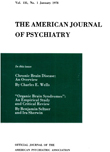Pituitary thyrotropin response to thyrotropin-releasing hormone in affective illness: relationship to spinal fluid amine metabolites
Abstract
The authors studied pituitary thyrotropin, i.e., thyroid-stimulating hormone (TSH), response to thyrotropin-releasing hormone (TRH) in patients with primary affective disorder. There were no overall differences between either depressed or manic patients and normal controls; however, the TSH response was significantly lower in the unipolar depressed patients than in either bipolar depressed patients or normal subjects. Bipolar patients in the manic phase tended to have a lower response than bipolar depressed patients. In the unipolar group, the TSH response showed a significant negative correlation with the serotonin metabolite 5-hydroxyindoleacetic acid (5-HIAA) in the CSF. These neuroendocrine responses may constitute markers of specific monoamine dysfunction in subgroups of patients with affective illness.
Access content
To read the fulltext, please use one of the options below to sign in or purchase access.- Personal login
- Institutional Login
- Sign in via OpenAthens
- Register for access
-
Please login/register if you wish to pair your device and check access availability.
Not a subscriber?
PsychiatryOnline subscription options offer access to the DSM-5 library, books, journals, CME, and patient resources. This all-in-one virtual library provides psychiatrists and mental health professionals with key resources for diagnosis, treatment, research, and professional development.
Need more help? PsychiatryOnline Customer Service may be reached by emailing [email protected] or by calling 800-368-5777 (in the U.S.) or 703-907-7322 (outside the U.S.).



